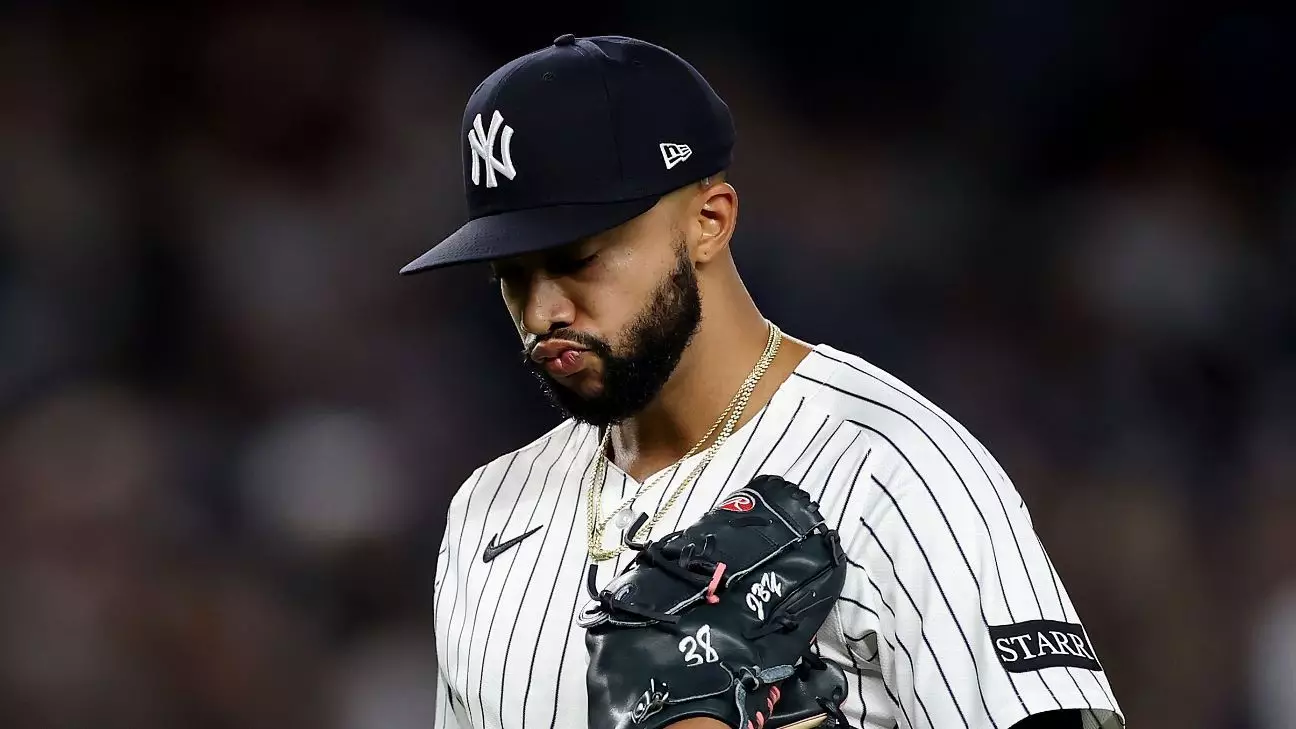The narrative surrounding Devin Williams, a talented reliever for the New York Yankees, has taken a disheartening turn this season. Once celebrated for his remarkable performance with the Milwaukee Brewers and as a two-time All-Star, Williams now finds himself grappling with a staggering 11.25 ERA early in the campaign. This decline has raised eyebrows and led to intense discussions within the organization about his future in the closer role—one that seemed secure just months ago. Yankees manager Aaron Boone hinted at possible changes, stating, “We’ll have a talk through that stuff,” which only compounds the uncertainty surrounding Williams’ performance and confidence.
Williams’ latest outing against the Toronto Blue Jays was a striking illustration of his struggles. Entering the game with a fragile lead, he faltered under pressure, allowing a hit and a hit-by-pitch before giving up a two-run double to Alejandro Kirk. The reaction from the Yankee Stadium crowd was deafening—boos echoed across the stands, a stark reminder of the weight of expectations that come with playing in one of baseball’s most iconic venues. Williams’ inability to convert saves and maintain composure has sparked demands from fans for setup man Luke Weaver, who holds an impressive ERA this season, to take over closing duties.
From Hopeful Acquisition to Underwhelming Performance
In December, when the Yankees acquired Williams from the Brewers, he was envisioned as the new cornerstone of the bullpen, ready to fill the shoes of former closer Clay Holmes. Williams had made headlines not just for his pitching prowess—demonstrated by his devastating changeup known as “The Airbender”—but also for his influence off the field, notably persuading team management to reconsider their stringent no-beard policy, a move that resonated with fans and players alike.
However, the Williams who has taken the mound for the Yankees has been a shadow of his former self. The consistent command and bat-missing capability that once defined his game have dissipated. Williams’ historical difficulties in April have come to a head this season, where his struggles have escalated far beyond the typical slow starts in previous years. The metrics tell a concerning story: after facing 44 batters and allowing 10 earned runs in just eight innings, Williams has seen his strikeout rate plummet from 40% to a staggering low of 24.1%. This rapid decline is striking, especially given his past success which held opponents to a measly .133 batting average.
The Psychological Toll of Athletics
From a psychological perspective, the pressures faced by athletes at this level can be immense. Williams’ comment about his performance—“Just nothing’s working right now”—speaks volumes about the internal struggle to regain confidence and consistency in the face of adversity. The juxtaposition of the jubilant cheers from a supportive crowd during successful outings against the contrasting boos in moments of failure can significantly impact an athlete’s mental state. When an athlete begins hearing boos from their home fans, it can create a cycle of anxiety and self-doubt that might further inhibit performance.
It’s noteworthy how Williams is handling the criticism. His response, indicating that he has “no opinion” on the crowd’s reaction, should be read as both resilience and a detachment from immediate external pressures. Believing in oneself is crucial, especially as critics and fans alike are quick to write off talent when performance falters. Unfortunately, this period of turmoil for Williams showcases the unpredictable nature of sports—what was once a celebrated career can swiftly spiral into uncertainty.
A Call for Strategic Intervention
The Yankees are at a crucial juncture. With playoffs aspirations on the line, decisions must be made, not just for the team’s success, but for Williams’ career longevity as well. Boone’s acknowledgment of the situation suggests a willingness to explore alternatives, potentially allowing Williams to regroup while further assessing the potential of Weaver. Such strategic intervention might benefit both the team dynamics and Williams individually—taking a step back may lead to a resurgence.
The Yankees must tread carefully, balancing the need for immediate success with the long-term development of a once-promising arm. The window for accountability in sports does not often allow for grace periods, but the hope remains that Williams can eventually rediscover his rhythm. He embodies an athlete’s core battle: to rise from the ashes of despair, reclaim confidence, and produce once again at the elite level expected of him. The road to redemption may be steep, yet it is precisely that challenge that defines not only careers but legacies in baseball.

